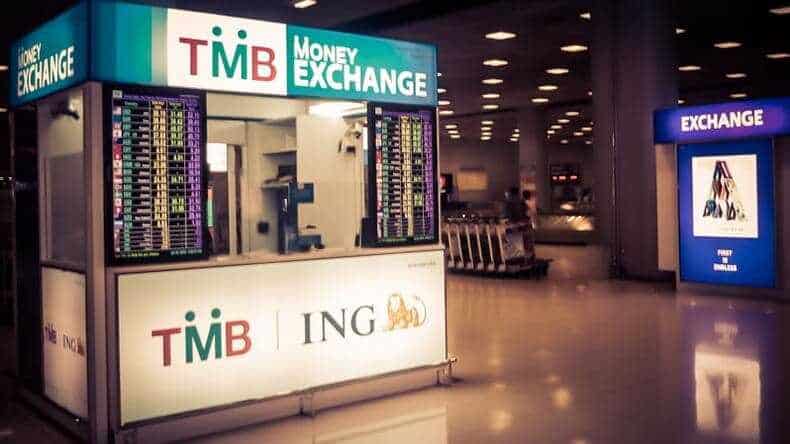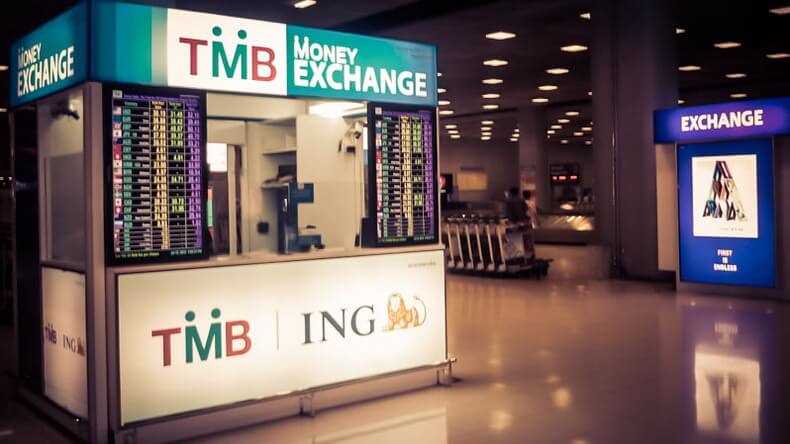Bat (gender case “baht” ㅡ the national currency of Thailand. It is currently treated as 1:2 to the ruble. There are 100 satang pennies in one baht, but they are slowly disappearing from use.
Hybrid.ai ads
There is a misconception that in tourist countries like Thailand, you can pay for any private service with dollars. In fact the opposite is true; the locals are very distrustful of any foreign currency.
Does this mean that it is not worth bringing dollars in Thailand (what currency to take in Thailand)? Certainly not. You should take dollars, and the more value of the bills, the more favorable their exchange will be. You can do this as soon as you arrive at almost any Thai airport, for example at Bangkok International Airport.
It is, however, better to give preference to a small currency exchange or bank branch on the street ㅡ so you can win on the exchange of $100 the amount equivalent to a kilo of fruit and a bottle of good beer.
The most predatory exchange rate ㅡ in hotels in popular resorts in Thailand ( kinds of cheating in hotels). You can’t even believe that someone could take their money there. But not everyone knows that most of the small bank branches are closed on Sunday, and on weekdays they are open only until 3:30 pm, so the phenomenon “takes place”.
It’s most profitable in Thailand to exchange traveler’s checks: bank displays even separately highlight their rate in bold to emptily attract visitors. In general, exchange rates for all currencies fluctuate slightly from branch to branch. Euros, pounds and any other known world currency may be exchanged with the same success as dollars.
Typical currency exchange kiosks in Thailand
With a lot of fraud with old banknotes in Thailand, you may be refused to exchange dollars issued before ’93. In some places the exchange may ask for your passport and address of residence, ㅡ be prepared for this. Speaking of the passport, do not dare to lose it, and if you do lose it, what to do if you lose your passport, we already discussed.
Currency exchange in Thailand is easily done in every major store. So is withdrawing cash from an ATM. In addition to the fee of the bank that issued the card and the fee of the bank-owner of the ATM, there is always a fee of 150 baht. The final figure the ATM will show before you confirm the withdrawal operation. There is usually a limit on cash withdrawals ㅡ 20,000 baht.
Bank cards are accepted at most major retail outlets in Thailand, but not all (such as Makro). In this case the commission for exchange is not charged. In general, changing cash is more profitable than withdrawing it from ATMs, and even less you lose by paying by card. Of course, it is better to have a card account in dollars, and in dollars it is better to receive all receipts to it. But keep in mind that Thai ATMs carry some dangers, for more information see “How not to lose your money in Thailand”.
Even before you leave for Asia, warn your bank about the trip: the region is associated with an increased risk of fraud, and there have been cases where the card was blocked after the first transaction in Thailand.
Read More:- How not to lose your money when you travel.
- What are the best currencies to bring with you to Thailand?.
- How do I open a bank account in Thailand and get a bank card?.
- Suvarnabhumi Airport in Bangkok – post-arrival activities.
- Introduction to Thailand – step by step instructions.
- Transsexuals in Thailand – why are they so popular?.


